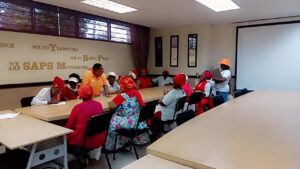
By Sweetness Pullen
Telling stories of underrepresented groups living amongst us who face violence is a very distressing task, but we have a choice to change this by coming together to fight for a violence-free community.
In our approach to fight violence against underrepresented groups, we use a holistic approach to encourage community members become more participative and supportive. By encouraging different foreign national groups to formally organise themselves by creating forums, they have become important stakeholders in our community discussions. This has helped us report incidents of violence and also address related challenges in a more useful, efficient, and responsive manner. Members of these groups have been active and continue taking part in all our community engagements and empowerment programmes, fostering a sense of inclusivity.
We have formed collaborations with government departments, advocacy organisations and local NGOs which has significantly improved community relations, particularly in addressing violence. For example, through this collaboration, a WhatsApp group was formed for immediate community response to violence incidents. Leaders of various foreign national forums have used these platforms to share information on the challenges they have, such as discrimination and language barriers in clinics at local levels. The involvement of the health department representatives has led to practical solutions such as using some of the forum leaders to represent their nationals by providing interpretation to the non-English speakers. While this WhatsApp group has been a lifeline for some foreign national shop owners, there are still challenges with a few who form alliances with criminals for protection which highlights the need for increased awareness and support to discourage such risky strategies.
We have conducted several cultural competency and awareness campaigns to benefit both local residents and non-nationals. Such efforts have been directed at educating the local non-nationals on the cultural norms of the hosts and help them integrate with the locals, while the same locals understand the various cultures that are present in their setup. We have also emphasised legal protection and awareness, educating the community about South African laws regarding foreign nationals and the importance of non-discrimination, including respect for sexual orientation diversity.
To combat violence, the Victim Support Centre in Motherwell, in partnership with the Kagisano Programme, and peacebuilders actively collecting data – plays a crucial role in documenting incidents of victimisation. This data helps us identify hotspots, and develop targeted awareness campaigns, alongside the creation of safe spaces for the elderly to report abuse. This has led to a significant increase in reported cases where we have also provided crucial support.
Despite these efforts, gaps remain, particularly in addressing cultural sensitivity and aligning with national laws, such as those regarding the age of consent for marriage . Incidents involving the LGBTQIA+ community are underreported, highlighting the need for further outreach. The LGBTQIA+ community also lack formalised groups due to cultural norms, which underlines the ongoing challenge of ensuring inclusivity and support for all underrepresented groups.
While we still have a long way to addressing violence, our narrative demonstrates that, even though it is not always easy, when we all come together, we can make a big difference in making our community a better place for everyone.
Sweetness Pullen is the Kagisano Programme’s Implementing Partner Representative in the Motherwell area.